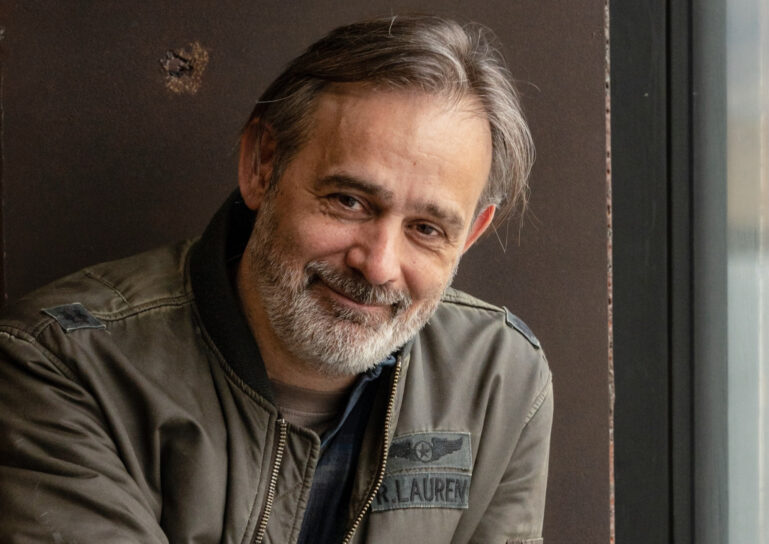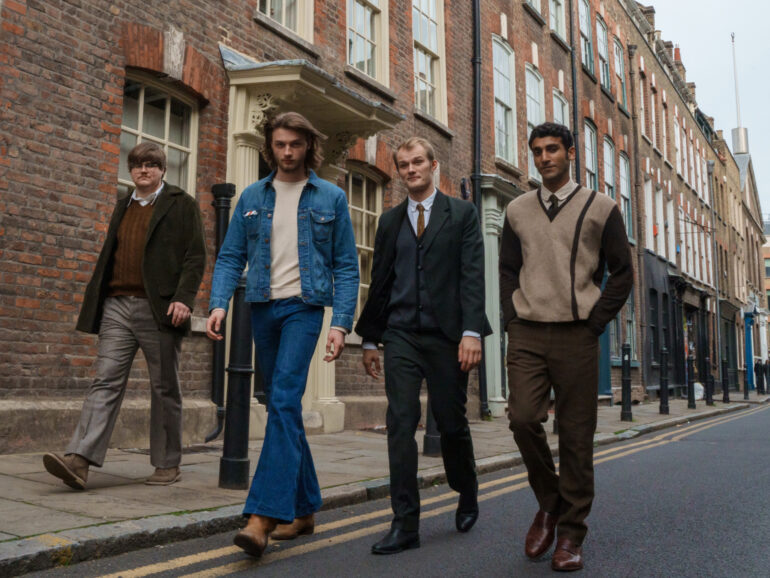Written by: Marta Balaga
19.09.24
Touch filmmaker looks for authenticity instead of tourist-friendly version of Iceland.
Recently selected as Iceland’s Oscar submission for the Best International Feature Film, Baltasar Kormákur’s Touch(Snerting) – nominated for the Nordic Council Film Prize 2024 – thrilled Icelandic audiences as well, setting local box-office on fire. Written by Kormákur – behind 101 Reykjavík, The Deep (Djúpið) and blockbuster Everest – and Ólafur Jóhann Ólafsson, the latter also behind the novel it’s based on, it follows Kristófer, who studies in London in the 1960s.
On a bet, he decides to apply for work as a dishwasher at a Japanese restaurant. That’s where he falls in love with Miko, the daughter of its owner, hailing from Hiroshima and hiding some secrets. Fifty years later, Kristófer (Egill Ólafsson) decides to revisit his youth, but not just because of nostalgia. He’s ready to finally look for answers to questions that have been haunting him for decades. Agnes Johansen and Kormákur produced the film for RVK Studios, and Mike Goodridge co-produced it for Good Chaos. Focus Features distributes in the US.
You told me that in Iceland, Touch made more money than Dune 2. Why do you think local audience responded this way?
Most Icelandic films are about farmers and domestic animals. It’s weird, because we all live in cities, but no – our films are always about this “old way of living” [laughter]. I have nothing against it, but we are slowly turning into a tourist show. I was once called the biggest enemy of Icelandic tourism, just because I made Jar City (Mýrin). It was bleak, but Trainspotting didn’t hurt Edinburgh – quite the opposite. There’s more to Iceland than waterfalls.
When you are trying to impress other people too much, you lose who you really are. Yes, there are those who believe in elves, but the majority of Icelanders doesn’t think about them at all. And yet here we are, promoting this romantic idea of our country. Touch doesn’t even take place in Iceland, and except for its first five or ten minutes, it features other languages. I was nervous about this at first, but its success shows that people are open to it.
It makes me think of a conversation we are having these days: What is a “Nordic” film anyway?
Exactly – what is an Icelandic film? To many, it involves a farmer and a dog. But we have already used up all our domestic animals in films. There’s only a chicken and a pig left.
Americans don’t limit themselves this way when they talk about “American” films, so why do we? Authenticity is incredibly important to me, so let’s really think about who we are right now and what our society looks like. This time has come.
You are coming back to classic cinema here a bit. To a big love story and proper melodrama that spans decades.
Possibly, but I think we go in circles with these things anyway. I remember what I used to watch when I was growing up: Mississippi Burning, Witness. Films I still remember, because they would actually take you to different places. Still, there is nothing old-fashioned about love. And yet it’s so difficult to find a love story these days that feels worth telling! Touchisn’t just about love, however – it’s more about someone who desperately needs closure. Kristófer knows there’s something missing in his life, and he wants to find it before it’s too late.
Listen – I am 58 years old now, so there has obviously been a change in perspective since I made 101 Reykjavík [in 2000]. You do get to the point when you want peace, when you want to make amends with yourself and with those you’ve crossed paths with. I think people can identify with this feeling.
Or maybe they can appreciate the warmth of this story? I don’t even know where it comes from, because Kristófer begins his journey during the COVID pandemic, and he’s completely alone. It could be so tragic.
Casting Egill Ólafsson in that role is one of the reasons it feels that way. I didn’t want his character to feel like some poor old man, wandering the world like Chaplin’s The Tramp. Not at all – I wanted a man who is graceful. It’s there, in the way he carries himself, in the way he dresses. It’s an ode to my father, and there’s something so beautiful about it. I also wanted to add some humour to his journey. Not too much, it’s not laugh-out-loud funny, but it’s always about looking at the glass being half-full rather than half-empty. I kind of like humanity, I guess.
This kind of perspective might be needed these days. Touch’s box-office results seem to confirm it.
Things can be so commercial you can’t stand them, or so arthouse-y no one is going to watch them – apart from your own family at some festival. I would love to marry these two things more often. It almost feels like a crime, making a film people actually want to see, but I would like to underline this word: generosity. If you invite the audience to go on a journey with you, they might be willing to do that.
I like the idea of taking someone by the hand. Otherwise, it’s like hosting a party, playing the kind of music no one wants to hear and then complaining they didn’t want to come. As much as I liked Oppenheimer, I think of Touch as its little cousin. It talks about the same events in a much quieter way. I don’t focus on politics here: I focus on the consequences, because today, we are thinking about repeating the same things all over again.
It’s interesting to see you being nominated for the Nordic Council Film Prize again, because you haven’t made a film like Touch before. Does it mean people are open to this new side of you?
It could mark a new beginning for me, sure, but when I made my first film, I was called the Almodóvar of Iceland. After The Sea (Hafið), I was the Bergman of Iceland. Then I had some success in the US, so I became “the Mark Wahlberg guy” [laughter]. People have tried to put me in boxes all my life, and I just follow the stories I want to tell.
I will probably continue doing the things I like. I am grateful for all the opportunities I’ve gotten over the years – they allowed me to build a studio in Iceland, for one – but as I said, we tend to limit ourselves based on other people’s expectations. I don’t want to do that. It always has to feel authentic – authentic to me.
Official trailer:
The film will be screened at Helsinki International Film Festival and NCFP events in Copenhagen, Stockholm and Reykjavík. To read more about Touch: CLICK HERE.
The Nordic Council Film Prize was first awarded in 2002 and then permanently established in 2005, and is to be juxtaposed with the Nordic Council Literature Prize, the Children & Young People's Literature Prize, the Music Prize, and the Environment Prize. The winner of the prizes will be announced October 22 via RÚV.

